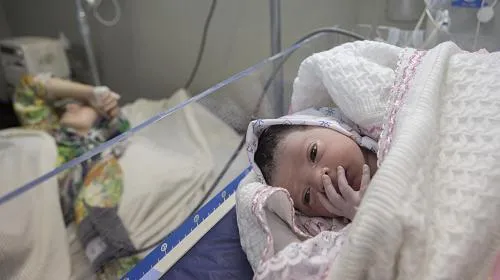Jerusalem (July 18, 2014) — CARE and its partners are preparing to provide emergency mobile health teams to serve people affected by the violence in Gaza. Needs are particularly high for pregnant women and for those who can’t travel to hospitals or medical clinics. Pregnant women are traveling to hospitals in the midst of the bombing to get medical support, while other people are unable or unwilling to leave their houses for anything other than life-threatening injuries.
“We are getting reports from our partners that pregnant women are risking their lives to get to hospitals, because they feel they will be safer there than in their homes,” said Theo Alexopoulos, with CARE’s Emergency Team in Jerusalem. “But they can’t stay in the hospitals forever. Then where do they go? There is no safe place in Gaza.”
As soon as the security situation allows, CARE and its partner, Palestine Medical Relief Society (PMRS), are planning to run two mobile health teams that would visit an average of 200 patients per day, providing basic health care to people living in affected communities by the ongoing violence. The teams will include medical staff and a psychosocial worker to help traumatized families, and will focus in particular on women’s health needs, particularly pre- and post-natal care for pregnant women and new mothers with infants.
“If pregnant women can’t get the health care they need, if newborns can’t get the health care they need, there is an increased risk of medical complications, which could put the lives of the baby or the mother at risk,” said Alexopoulos.
Thursday’s ceasefire provided a brief window for people to safely get medical support, and to get food and supplies for their families. But a few hours without bombs is not enough; a permanent ceasefire and a resolution to the conflict is needed immediately, or people will continue to suffer.
The health system in Gaza is under enormous strain and is in desperate need of supplies, particularly fuel for generators, drugs, and medical supplies. Some hospitals are already reporting that they don’t have basic materials such as sutures to treat wounds of people injured.
About CARE:
CARE is one of the world’s largest humanitarian aid agencies, providing assistance in nearly 70 countries. CARE has been working in Israel, West Bank and Gaza since 1948 (with a short break from 1984-1994), initially implementing programs to help immigrants after the Holocaust. Today, our programs focus on economic empowerment (including livelihoods and gender equality) in Gaza and the West Bank to assist the most vulnerable residents in meeting their basic needs. With the current fighting, CARE has temporarily suspended its programs until the security situation improves.

